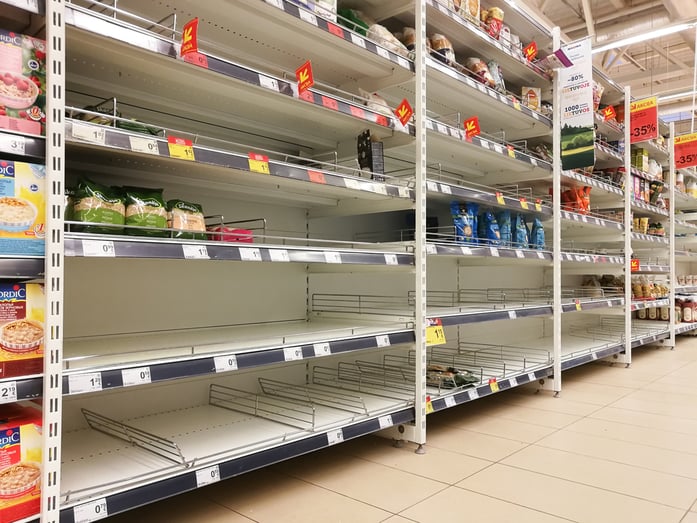
- Home
- PLM Blog & News
- The War in Ukraine is Shaking Up Retail Products & Global Supply Chains. Here's How Companies Can Adapt.
The War in Ukraine is Shaking Up Retail Products & Global Supply Chains. Here's How Companies Can Adapt.
|
Retail
|
Food industry
Posted By:
Hafida Saidani
This year, the global retail industry is facing urgent, new market risks and uncertainties. After enduring the effects of the COVID-19 pandemic – including supply chain disruption, store and factory closures, and rising inflation – global retailers and consumer packaged goods (CPG) manufacturers were jolted by Russia’s invasion of Ukraine in February 2022.
Let’s examine the ripple effects of the ongoing war in Ukraine, including its impact on retailers, consumer packaged goods (CPG) manufacturers and consumers around the world.
Russia’s war in Ukraine rattles the global food sector
Russia’s invasion immediately disrupted ships and air cargo from leaving Ukraine, including food products headed for destinations around the world. As a result, food commodities drastically declined in availability. Since Ukraine is the “breadbasket of Europe,” reduced exports from Ukraine quickly led to price hikes for wheat, barley, soybeans and oils.
Ukraine and Russia are both among the world’s top five wheat exporters, accounting for 28.9% of global wheat exports before the war, and now straining the global supply chain and inflating wheat prices. Wheat prices rose 76% in the year ending April 2022, as it is a key ingredient in foods like baked goods, pasta, noodles and breakfast cereals.
In addition, Ukraine and Russia accounted for 60% of global sunflower supplies before the war, which created new market risks, as sunflower oil and seeds are raw ingredients used in many processed foods.
Ukraine’s global food influence, both developed and emerging markets are feeling the effects of this war. Countries that depend on food imports from Ukraine and Russia, especially in the Middle East and Africa, will be hit hard by global food inflation and potential food shortages. Egypt, Tunisia, Algeria, Morocco, Lebanon and Turkey are among those most at risk. To continue to afford food staples amid rising inflation, more global consumers have become price-conscious, shopping around for the best deals and switching to more private labels.
How retail companies are adapting to market volatility
The war in Ukraine war has created upheaval in the global supply chain, including trading partnerships and business practices. Now that costs, risks and uncertainty are mounting, retailers and CPG manufacturers are re-examining their product sourcing and reformulation processes to find better ways to meet consumers’ food requirements.
New trading partnerships are emerging and industry experts predict Russia’s invasion of Ukraine will further accelerate the shift from global to regional product sourcing to protect global food security. That’s because countries that depend on Ukraine for food (including Algeria, where 48% of total wheat imports come from Ukraine) will need to consider other nations as new sources of grain exports.
Product development is also in flux due to the war in Ukraine, prompting the need for more product reformulation. The shortage of sunflower oil has forced some manufacturers to replace this scarce ingredient with alternatives like coconut oil or palm oil, while other companies use rapeseed oil as a substitute.
Grocery retailers and food manufacturers are paying closer attention to these product reformulations, as new ingredients can change a product’s nutritional profile due to the oils’ differing amounts of saturated fat. For instance, retailers’ assortment strategies are directly affected because food products impacted by the sunflower oil shortage include cross-category products like: baked, canned, pre-made foods, spreads, sauces, soups, confectionary, baby food, and foods cooked in oil like potato chips and breaded fish.
In response, global many CPG manufacturers and retailers are finding new ways to be agile and creative with reformulations to keep products in stock despite ingredient shortages. For instance, Swedish potato chip brand OLW replaced some of its products’ sunflower oil with palm oil. In France, Carrefour’s private label raspberry tiramisu now contains coconut oil instead of sunflower oil, as does rival Casino’s private label tiramisu.
How companies can keep satisfying consumers’ needs
As retailers and manufacturers navigate market volatility, including the Ukraine war, more companies are turning to innovations to gain agility, efficiency and insights for effective decision making.
Specifically, more global retailers now use product lifecycle management (PLM) software to manage and speed up private label product development. Trace One PLM helps private label teams boost productivity and operational effectiveness while adapting to increasingly complex, international market trends. To develop remarkable products, including private labels, that consumers love, global retailers are embracing retail-specific PLM solutions for streamlined collaboration, increased efficiency and risk mitigation.
To help companies identify products that may require recipe reformulation or new sourcing partners for ingredients, Trace One Insight offers timely, actionable insights to reduce risk by staying responsive to fluctuating market conditions. These insights help retailers and manufacturers efficiently and proactively review their products and recipes for potential business challenges like shortages and ballooning expenses.
Stay prepared with efficient collaboration and effective insights
For resilient, agile supply chains that can navigate the effects of war in Ukraine, global retailers and manufacturers are now changing how they work and with whom. To protect business continuity, more companies are embracing efficient, collaborative solutions to keep up with consumers’ changing needs without compromising product quality, safety or brand trust.